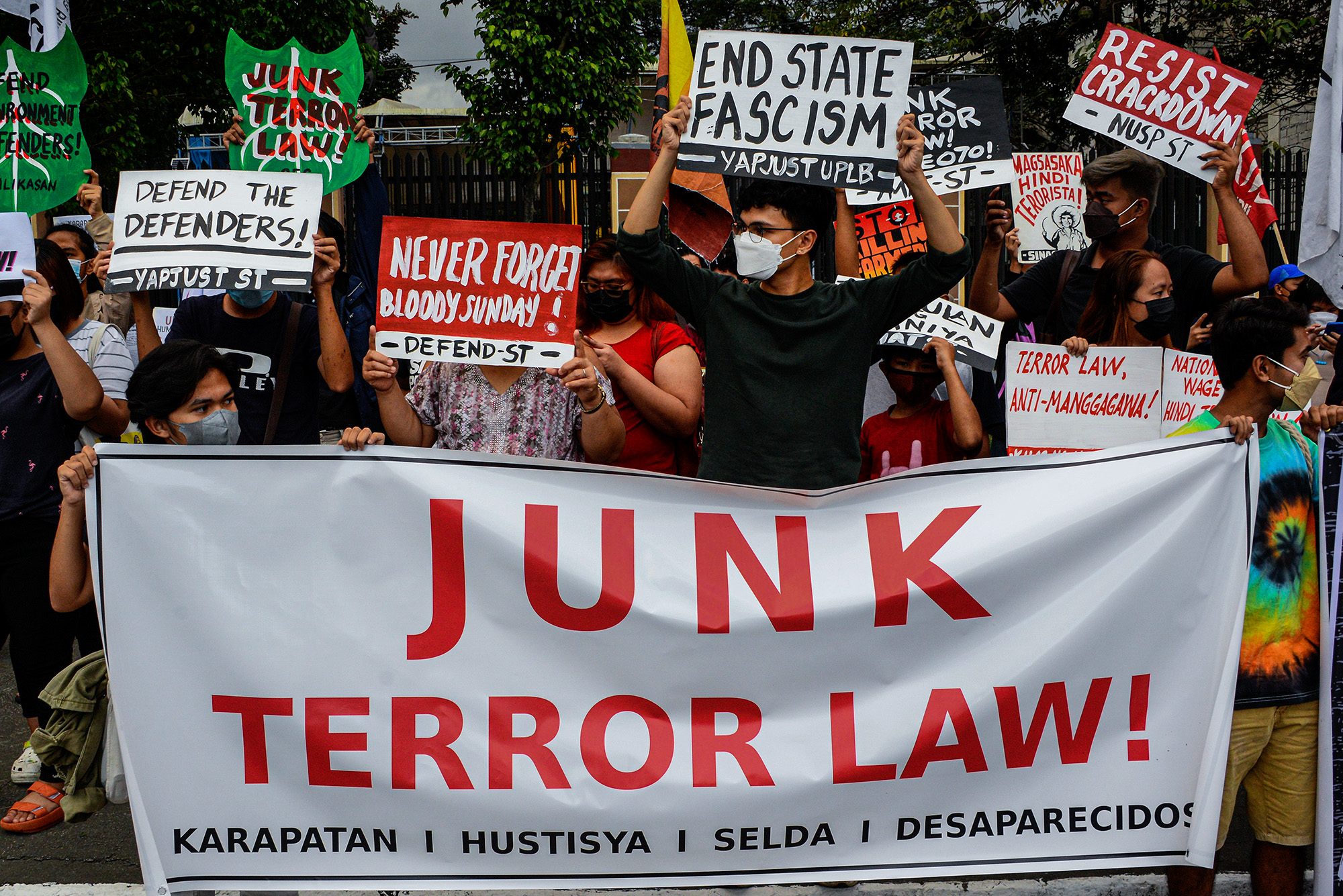SUMMARY
This is AI generated summarization, which may have errors. For context, always refer to the full article.

MANILA, Philippines – The Supreme Court’s ruling on the heavily contended anti-terror law which struck down a qualifier on “harmful” dissent may ease fears, but the law remains to be a dangerous one, said lawyers who filed petitions before the High Court.
“It is a small victory in what is still a big defeat for human rights,” said Tony La Viña, who represents red-tagged indigenous peoples.
The Supreme Court announced on Thursday, December 9, that it upheld most parts of the feared anti-terror law except for two things – the power of the anti-terror council to designate a person or a group as terrorists based on another country’s request, and the part in the definition where dissent is a terror act if it is found to have an intent to cause harm or death.
With one phrase being removed from the definition, the qualifier under Section 4(e) now reads: “Terrorism as defined in this section shall not include advocacy, protest, dissent, stoppage of work, industrial or mass action, and other similar exercises of civil and political rights.”
“Exercise of rights, acts of dissent, as listed in the proviso, can no longer be included in the definition of terrorism. It’s now a clear exception in Section 4,” said Ted Te, former Supreme Court spokesperson, who is both counsel and petitioner in the anti-terror law case.
“Malaking bagay na ‘yun (it’s a big deal),” said Neri Colmenares, counsel to petitioners and senatorial aspirant, because for him, activists and Filipinos alike would now feel more free to express dissent to the government.
“Maraming natakot sa terrorism law, ayaw na nilang magsalita, ayaw na nilang sumama sa kung ano-anong freedom or exercise of constitutional rights, baka matawag akong terorista, now may assurance na from the Supreme Court,” said Colmenares.
(Many feared the antii-terrorism law, they don’t want to speak, they don’t want to join the exercise of their constitutional rights for fear of being called as a terrorist, but now there’s an assurance from the Supreme Court.)
But because Section 4, except for that phrase, has been retained including definitions which petitioners said were very broad and vague, Colmenares said “it’s still very dangerous.”
For example, the third mode of designation under Section 25 was retained, which gives the executive anti-terror council the power to designate a person or a group as terrorists based only on their own determination, without having to go to court.
Under Section 25, designation will lead to a freezing of assets, although petitioners have expressed fears that some overlapping powers may lead to an abusive interpretation where designated people, or close associates of designated people, will be arrested, or at the very least, targeted.
Section 29, which gives the council the power to detain a suspect for 24 days, was also retained.
“CPP-NPA ka lang sabihin sayo, pwede ka nang ma-24 day detention, pwede ma freeze assets mo, pwede ka ma designate, yun yung problematic area duon, kaya ako, ofcourse we will still have to read the full decision but very likely we will file a motion for reconsideration,” said Colmenares.
(They can just call you a CPP-NPA, you can be subjected to a 24-day detention, your assets can be frozen, you can be designated, that’s the problematic area there, so of course I will still have to read the full decision but very likely we will file a motion for reconsideration.)
Far Eastern University Law professors, also petitioners, said the retention of Section 29 or the prolonged detention of up to 24 days “would be more than chilling enough to stifle, suppress, if not totally snuff out, any fire, flame or even flicker of indignation or protest against government corruption, oppression and abuse.”
The government can also file a motion for reconsideration if it wants to.
“We will certainly regroup and close ranks and file a motion for reconsideration. We will not allow the dying of the flickering light of our basic rights,” said Edre Olalia, counsel to petitioners.
Also retained are provisions that make inciting to terrorism a crime and house arrest for someone who has already been granted bail.
“These problematic provisions are contrary to due process, right to be secure in persons, houses, papers and effects, rights to freedom of association, among others, which are protected by fundamental law,” said Sonny Matula, counsel for labor petitioners.

Legal standing
Howard Calleja, a petitioner, highlighted the fact that their petitions were not dismissed based on procedural grounds.
That’s what Solicitor General Jose Calida would have wanted – to dismiss all petitions for lack of legal standing, and for it being a political question.
“For now, we celebrate the fact that we have hurdled procedural issues. We are grateful that the court recognized our legal standing in this case and discussed it on the merits instead of dismissing it outright on alleged technicalities,” said Calleja.
Te said the striking down of the qualifier on dissent “clearly indicated” that the Supreme Court recognized it was a valid facial challenge. Facial challenge means contending a law that has not directly injured the petitioners, in this case, the legions of petitioners who were neither arrested nor charged under the law.
“I think it clearly indicates it was a facial challenge, because they took action, they declared it unconstitutional on the grounds of freedom of expression,” said Te.
What now?
Because there is no full copy of the decision yet, and motions for reconsideration are expected to be filed, how would the anti-terror law be implemented in the days to come?
Interior Secretary Eduardo Año said the effect would be “minimal.”
“We’ll make appropriate adjustment but we strictly implement Anti Terrorism Law strictly in order to protect the people against all acts of terrorism,” said Año.
The currently charged people under the anti-terror law are four farmers in Mindoro, facing charges of providing material support to terrorists over accusations that they are harboring communist rebels. They were arrested in July, and still in jail, according to Kyle Salgado, spokesperson of Karapatan Southern Tagalog.
The Supreme Court never issued a temporary restraining order.

– Rappler.com
Add a comment
How does this make you feel?






There are no comments yet. Add your comment to start the conversation.